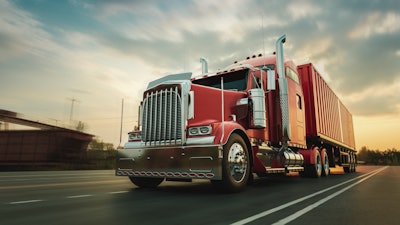
Sen. John Cornyn (R-TX) on Tuesday suggested using a truck-only vehicle miles traveled tax during the Senate Finance Committee's hearing on infrastructure funding.
His suggested method would levy a tax of 25-cents for every mile driven. The mileage would be tracked via government-mandated devices that report the data back to the IRS.
Tuesday marked at least the second time Cornyn has eyed a potential trucking-exclusive tax, having previously floated the idea in 2019 to support a five-year highway bill.
While Cornyn did suggest a potential VMT could come with "perhaps some relief on other fees" levied on truckers and fleets, Texas Trucking Association President and CEO John D. Esparza noted taxing drivers a quarter for every mile equates to approximately $25,000 per truck that drives 100,000 miles a year – almost half the average salary for a truck driver.
"Eighty-eight percent of trucking businesses in Texas are small mom and pop shops already operating on paper thin margins who can ill afford to be targeted while helping the nation recover from a global pandemic," he added. "For those that can manage to survive a massive consumption tax, it will result in increased costs of goods and services for all consumers. What is bad for trucking, is bad for all Texans and a discriminatory tax will be felt by everyone."
Cornyn's suggestion might have been unofficial or informal, but a report compiled by the American Transportation Research Institute found that costs associated with implementing a VMT tax could far exceed any revenue gains.
ATRI found that replacing the fuel tax with a VMT tax, which would be assessed on 272 million private vehicles, could result in collection costs of more than $20 billion annually – about 300 times higher than the federal fuel tax. Hardware costs alone (mostly attributable to providing motorists with a GPS-enabled device) could have an initial price tag of $13.6 billion and require ongoing replacement. Telecommunications costs would be approximately $13 billion annually, and account administration would be an additional $4.3 billion each year, ATRI estimated.
"On top of these costs, credit card transactions for electronic payment and even the shipping costs for the hardware could each cost more than $1 billion," the agency said.
Following Tuesday's meeting, American Trucking Associations President and CEO Chris Spear called Cornyn's method "really mind boggling," citing that the senator didn't speak to Texas truckers, yet "wants to tax the central and most critical link in the supply chain as the economy tries to climb out of the COVID recession."
Spear noted a VMT tax could have "disastrous consequences for our economy, killing good-paying trucking jobs across the county while hitting consumers hard with higher prices for gas, food, medicine, and everything else they use and depend on their daily lives."
"If Senator Cornyn was looking to throw a wrench in our recovery at the worst possible moment, he found the right policy with his Cornyn Tax,” Spear added.
Owner-Operator Independent Drivers Association (OOIDA) penned a letter Tuesday to members of the Committee on Finance stating matter-of-factly their position that "truckers already pay more than their fair share into the HTF (Highway Trust Fund)."
"Not only is our industry currently paying more than its fair share, a report by the Congressional Budget Office found HTF revenues derived from motor carriers through the heavy-vehicle and tire taxes will increase from 2019 to 2029," the association wrote. "Between the current diesel tax and these supplemental taxes that other highway users do not pay, the trucking industry is estimated to increase its contributions to the HTF over the same period of time."
The HTF – the primary source of federal funding used by state governments to maintain and improve roads – is funded currently almost exclusively by a per-gallon excise tax on gasoline and diesel fuel. The current federal fuel tax rates of 18.4 cents on gas and 24.4 cents on diesel were last increased in 1993. Since then, improvements in vehicle miles per gallon, combined with inflation over that 28-year span, have undercut the HTF's ability to adequately fund roads projects and the roughly $40 billion fund has faced annual shortfalls for more than a decade.
Persistent shortfalls in the HTF could be further exacerbated by the very infrastructure plan a proposed VMT is designed to support.
President Joe Biden's nearly $2.3 trillion infrastructure proposal includes $174 billion to encourage and support the purchase and use of electric vehicles, including incentives and tax breaks for individuals that buy American-made electric vehicles. Also baked into the plan is money to support the construction of 500,000 electric charging stations around the country and replace diesel-powered transit and school buses with ones powered by electricity.
Electric vehicles currently do not pay into the HTF.










